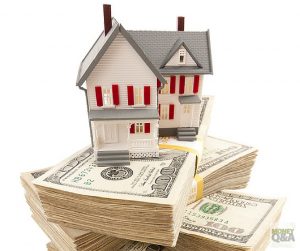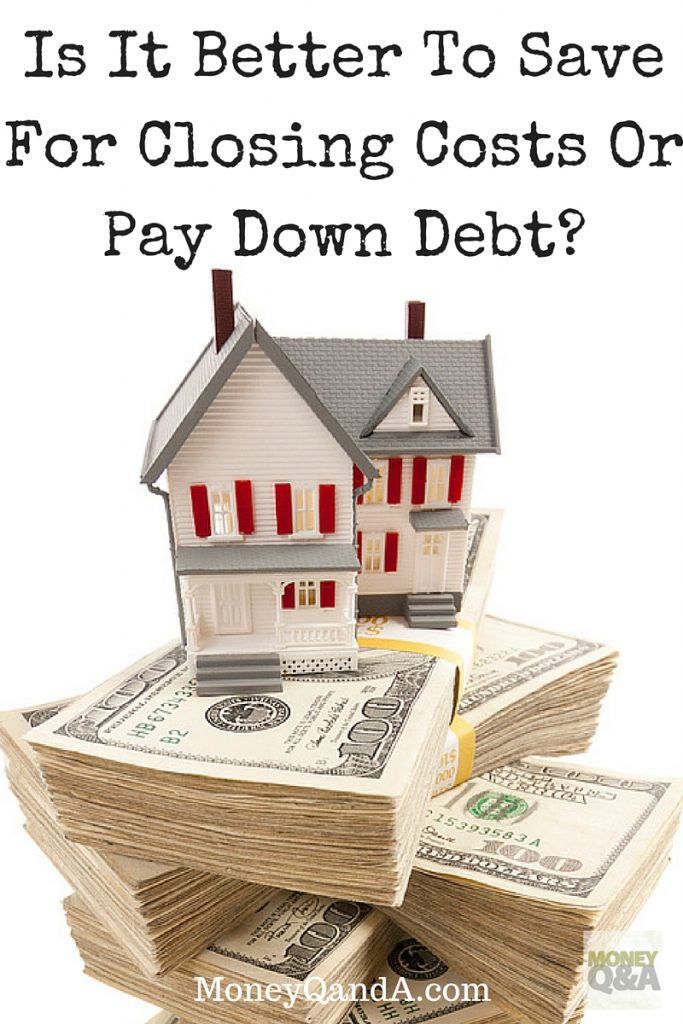
Here is the next installment in our Reader’s Questions Series which highlights questions emailed to me by you, the readers of Money Q&A, we talk about how to save for closing costs. Be sure to find out at the end of this article how you can receive a free copy of Dave Ramsey’s book, The Total Money Makeover if your money question is chosen to be featured on a future week’s blog post.
If you’re not familiar with Dave Ramsey’s book, you should run right out and get it. It is one of my top ten best personal finance books that everyone should read. Now….on to our reader’s question.
Is it better to save for closing costs when you are trying to sell your home? Or, should you pay down your home mortgage instead with the money?
Let me paint a picture of a recent email that I received from a friend. She has a thirty-year fixed rate home loan at 6.625% for $182,000 and a home equity line of credit with a balance of $30,000 and a 7.45% fixed rate. Her house is currently on the market for $215,000. She’s moving and like a good financial steward we all dream to be she has saved $20,000 to cover the closing costs that the seller will inevitably require her to pay in this type of buyer’s housing market.
Of course, the house is stalled on the market and stubbornly not selling. There is a fear that more price reductions will be necessary for the future to move it. So, my friend asked me if she should throw her $20,000 that she has saved up towards the loans’ principal balances if so which loan, or should she still keep that money for closing costs. Here are a few things to think about in this scenario.
It Does Not Matter Much If She Sells The Home
In some respects, if she sells her home, it is a case of “six in one hand, half dozen in the other hand”. It really does not matter what she does with that $20,000. It is awash in the end in the simplest example of this scenario.
If she pays down her loan principle, she will have to pay out of pocket for the closing costs or pay for them out of the proceeds of the home sale. If she does not pay down the loans with the money, she will still need to use that $20,000 for closing costs (which could run upwards of $12,000 or more) and also use the money for any difference she owes on the loans if the home does not sell for enough to cover her mortgage balance.
What About Keeping The House As A Rental?
The scenario and where to put $20,000 to work for you does change if you were to decide to keep the house and rent it out. One problem that my friend told me was that she could not rent her house for enough money to cover her mortgage, insurance, and property management fees each month. The amount of rent that she can demand in her area of the country for a house similar to hers is not enough to cover her monthly mortgage payments completely.
I asked my friend if she had thought about refinancing her mortgage thanks to the incredibly low rates that are available now, but she has a few things going against her. Her area of the country was caught up in the housing crisis like most others around the nation, and now her home is not worth what she purchased it for about five years ago.
She originally bought the home using an 80/10/10 loan approach in order to forgo paying private mortgage insurance (PMI) monthly. While taking out a mortgage for 80%, home equity for 10%, and putting 10% down let her skip the $150 or so PMI payments monthly, it has also set her up with high interest rates especially on the home equity line of credit. And, now her down payment has essentially disappeared because of the housing bubble bursting and home value decline.
In today’s market, most lenders are requiring homeowners to have at least 20% of equity built into their property’s value before they qualify for the best refinancing rates. You also have to be ready for refinancing your mortgage to takes a long time.
But, it could be well worth the effort if you are staying in your house for the foreseeable future. You want to make sure that the savings from refinancing to a lower rate eventually make up for the upfront costs of the fees to refinance which can run 3% or more of the mortgaged amount.
So, for my friend’s $215,000 home, she needs about $43,000 in home equity to qualify for the lowest refinance rates. So, she needs to whittle her loan balances down to about $172,000. I’m afraid even throwing all $20,000 at her mortgages will not make a big enough dent that she needs in order to qualify for a home mortgage refinance.
The Dangers Of Paying Down Your Mortgage
Believe it or not, there is a small danger in throwing all her savings at her mortgage. Even with the $20,000, she cannot get rid of the high-priced home equity line of credit. If she had $30,000 saved up, this would probably be a different email exchange and scenario altogether.
If she is going to pay off a loan, the home equity is the one to attack. Not only is it the smaller balance (the Dave Ramsey way) but it also is the highest interest rate as well. Eliminating this $30,000 debt will free up an additional $250 in monthly rent that she is currently paying.
I also worry about using her entire savings to pay off a portion of the mortgage principal. Hopefully, she has another fully-funded emergency fund saved somewhere else that isn’t included in this $20,000 closing fund account. If not, she leaves herself and her family very vulnerable with no savings but a lower mortgage balance.
Also, paying off some of her mortgage balance could lend her self to feeling more inclined to accept a lower offer on her home sale from a buyer which will eat into her profit on the sale. There is a real risk that she will not receive her entire $20,000 back in profit from a sale price that is over $20,000 above her mortgage and closing costs.
Wrapping It All Up
So, where does that leave us? To throw another wrench into the scenario, I know that my friend is moving out of state because of her job. She has to be in a new town and new state even by the end of the summer.
This doesn’t make the proposition of holding on to a property that won’t sell any easier. This is one reason why my wife and I decided to rent our home out at a loss with negative cash flow monthly. Eventually, my friend will be faced with having to pay rent in her new location and continue to pay her mortgage on her old home as well.
So, there you have it. Not an easy answer to this complex question. I’m a big fan of becoming a landlord even if initially it is at a negative cash flow loss every month. That’s the route my wife and I decided to go earlier this spring. Of course, that decision is not for everyone.
Past Readers’ Questions:
- Is A $1,000 Emergency Fund Enough To Start?
- How To Prioritize Which Bills To Pay First
- Should You Put Your Emergency Fund In Mutual Funds?
- How Do You Start Saving If You Live Paycheck To Paycheck?
- How To Find A Payment Plan Without Cutting Necessities
- Is My Money Save In A Bank?
- What To Invest In After The Company Match
Do you have a money question that you would like to ask? Email me your money, investing, retirement, savings, or other question to Questions[at]MoneyQandA.com. If I pick your question for the next article in the series, I’ll send you a free copy of Dave Ramsey’s book, The Total Money Makeover, or you can pick from any of these other free books instead.
Thank you all so much for all of the questions! I would really like to turn this into a weekly series of blog posts answering your questions every Monday. So, please keep them coming!


Pay down the loan. It’s easy to pay down the loan without spending a dime. Bi monthly payments have worked wonders for me.
I agree – be a landlord – You only lose if you sell.
If you allow a renter to pay down the debt for you and the home never increases in value – you still win.
The biggest reason you will win is because the government keeps printing money and that alone will drive up the values…. eventually.
I was in a similar situation. I had a house that was underwater, though not as much. After crunching the numbers and thinking it over, I decided to rent out the house. I am renting it at a loss, but what I am getting is better than nothing. I’ll take someone else paying my 80% of my mortgage until prices level off or increase.
If she does rent it out, she will have to research property managers to handle everything for her since she will be out of town.
Interesting Post!
I think pay down is the best option when we are trying to sell home. We can pay monthly payments and its really have worked great for me.